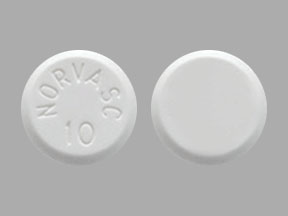Norvasc and Alcohol/Food Interactions
There are 3 alcohol/food/lifestyle interactions with Norvasc (amlodipine).
Amlodipine Alcohol (Ethanol)
Moderate Drug Interaction
AmLODIPine and ethanol (alcohol) may have additive effects in lowering your blood pressure. You may experience headache, dizziness, lightheadedness, fainting, and/or changes in pulse or heart rate. These side effects are most likely to be seen at the beginning of treatment, following a dose increase, or when treatment is restarted after an interruption. Let your doctor know if you develop these symptoms and they do not go away after a few days or they become troublesome. Avoid driving or operating hazardous machinery until you know how the medications affect you, and use caution when getting up from a sitting or lying position. It is important to tell your doctor about all other medications you use, including vitamins and herbs. Do not stop using any medications without first talking to your doctor.
Amlodipine Multivitamins With Minerals
Moderate Drug Interaction
Using amLODIPine together with multivitamin with minerals can decrease the effects of amLODIPine. Talk with your doctor before using amLODIPine and multivitamin with minerals together. You may need a dose adjustment or need your blood pressure checked more often if you take both medications. It is important to tell your doctor about all other medications you use, including vitamins and herbs. Do not stop using any medications without first talking to your doctor.
Amlodipine Food/Lifestyle
Minor Food Interaction
Information for this minor interaction is available on the professional version.
Switch to professional interaction data
Norvasc drug interactions
There are 546 drug interactions with Norvasc (amlodipine).
Norvasc disease interactions
There are 4 disease interactions with Norvasc (amlodipine) which include:
More about Norvasc (amlodipine)
- Norvasc consumer information
- Check interactions
- Compare alternatives
- Pricing & coupons
- Reviews (105)
- Drug images
- Side effects
- Dosage information
- Patient tips
- During pregnancy
- Generic availability
- Support group
- Drug class: calcium channel blockers
- Breastfeeding
- En español
Related treatment guides
Drug Interaction Classification
| Highly clinically significant. Avoid combinations; the risk of the interaction outweighs the benefit. | |
| Moderately clinically significant. Usually avoid combinations; use it only under special circumstances. | |
| Minimally clinically significant. Minimize risk; assess risk and consider an alternative drug, take steps to circumvent the interaction risk and/or institute a monitoring plan. | |
| No interaction information available. |
See also:
Further information
Always consult your healthcare provider to ensure the information displayed on this page applies to your personal circumstances.


